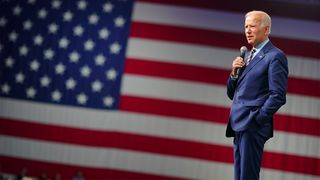The electoral numbers appear to be landing in favour of Joe Biden. But there will be recounts in some states and perhaps the need for definitive adjudication by the US Supreme Court. All this creates the impression of a flailing and declining superpower that is too flawed, divided and distracted to bet one’s future on. That has led to the writing of epitaphs for the country’s moral, strategic and economic leadership as domestic fissures are played out in full colour and sound to the global audience.
For many, Donald Trump began the rot or was perhaps just the embodiment of an America turning inward and losing the will and means to lead. For others, Biden will be a transitory rather than a transformational leader who will oversee his country’s quiet decline. Under these circumstances, the argument goes, it is time for Australia to consider options that do not entail doubling down on the alliance, which by extension is a bet on the US.
For many, Donald Trump began the rot or was perhaps just the embodiment of an America turning inward and losing the will and means to lead. For others, Biden will be a transitory rather than a transformational leader who will oversee his country’s quiet decline.
But these commentators are misreading the US, whose strength is that it is uniquely restless and on the move. Each administration assesses — wisely or poorly — how to change the country to make it stronger or better. In my lifetime Richard Nixon, Ronald Reagan, Bill Clinton, George W. Bush, Barack Obama and Trump drastically reshaped the direction of US domestic and foreign policy. Sometimes errors will be made, and the internal conversation is always rancorous because the stakes are high. But when it comes to Americans deciding on America’s role in the world, the alliance means we are part of that deliberation in ways that other nations are not.
It is easy to rub salt into American domestic wounds, mock its frequent changes in direction and predict its imminent irrelevance. But those doing so ought to be reminded that the immense global interest in this week’s election is proof that the US remains the most consequential nation in the world. That itself suggests the special relationship is worth protecting, nurturing and improving.
Chinese disruption
As far as foreign affairs are concerned, the beginning point must be to identify the great challenge and disruption to the comfortable regional existence Australia enjoyed for several decades. It is not the election of Trump and the disruption that ensured but the stridency of Xi Jinping’s China.
Beijing’s overt ambition to seize regional and even global pre-eminence preceded Xi but the latter has brought about a Chinese abrasiveness, coerciveness and tolerance for risk that is unprecedented. Xi also has demonstrated a dangerous impatience when it comes to realising longstanding Chinese goals such as eliminating existing liberal institutions in Hong Kong and integrating Taiwan into the mainland.
Bear in mind that it is also China, not Trumpian America, that has become the primary economic disrupter in the global system. This is not simply because of its enormous size but a result of the way China has interacted with the global economy. Take Xi’s two signature external-facing policies: the Belt and Road Initiative and Made in China 2025.
The BRI is about binding infrastructure, supply chains, services, technologies and markets to that of China’s to ensure that it is the latter economy that is the predetermined winner of any economic relationship in Asia, Eurasia, the Middle East, Europe and Africa. According to MIC2025, the Chinese state seeks to ensure Chinese firms become the dominant global players and chief exporters in the advanced sectors that will create and hold value in the future. How will it do that? Through extensive financial assistance to state-owned enterprises and “national champions” such as Huawei, preferential access to credit, and the forced and even illegal acquisition of foreign technologies and intellectual property.
Committed to alliance
During the previous decade, China has tried to use economic coercion to bully other countries, including Japan, South Korea, The Philippines, India and Singapore, into submission with varying degrees of success. If one does not pay the price of upholding one’s sovereignty, then the alternative is silence and servitude to China.
Australia is on the nose with China over issues such as banning Huawei from the 5G network; weeding out relentless Chinese attempts to interfere with and covertly influence Australian institutions, entities and individuals; daring to complain about constant cyberattacks against government and private networks; and calling for an international investigation into the source of a virus that has been the single most destructive health and economic event for many decades.
In this context, it is puzzling the reference to the US as the “indispensable power” leads to derision and scorn because one only need to do the maths.
China spends more on its military than the combined outlays of all other countries in East and South Asia and Oceania. The 2017 foreign policy white paper has a striking passage that commits Australia to working with democracies to create a favourable balance of power in the Indo-Pacific. Put simply, there is no possible balance without the US.
The 2017 foreign policy white paper has a striking passage that commits Australia to working with democracies to create a favourable balance of power in the Indo-Pacific. Put simply, there is no possible balance without the United States.
It is not just about raw numbers. Consider the government’s 2020 Strategic Defence Update, which describes what a proactive but still considerable power ought to do at a time of uncertainty: shape the strategic environment, deter other militaries from doing us harm and be able to respond proportionately with credible military force when required. Significant dollars are being put to future capabilities such as long-range and hypersonic missiles, unmanned weapons and offensive cyber capabilities. Far from preparing for a post-US strategic environment, the development of these capabilities is impossible without American collaboration and unachievable outside a robust alliance relationship.
Or consider the government discussion about upgrading Australian manufacturing in focusing on areas such as resources technology, medical products, clean energy, defence and space. When it comes to these and other innovative sectors on which advanced economies must excel such as advanced manufacturing, information and communications technology, and professional and scientific services, a recent study by the United States Studies Centre’s Jared Mondschein reveals that American firms dominate investment and collaborations in the local economy. In an era where strategic and security considerations increasingly will dictate our economic partners in high-value sectors, the prudent course is to broaden and deepen allied co-operation to include geo-economics and commerce.
Finally, there is the matter of our regional standing through the alliance. Countries such as Indonesia, Singapore, India and Vietnam may not have the same history and affection for the US but seek to preserve their freedom of action against Chinese encroachment. They know Washington is the indispensable balancer in the region, meaning our alliance enhances our relevance and standing with our neighbours.
Next administration
The greater obstacle to Australian strategic ambition, courage and resourcefulness is not imperfect American policy but the doubting of US resolve and decisiveness. Trump has had extraordinary hits and misses but he is the first president for a generation to cause Beijing truly to consider the costs of its actions. Our challenge in the past four years was about ensuring the intended outcome was not only a better deal for the US but also for Australia and the region.
If Biden enters the White House, he must eliminate doubts that his softer and risk-averse temperament will mean reduced cover for Canberra given Australia (with Japan) is the most forward-leaning in the region when it comes to countering the worst aspects of Chinese behaviour.
Biden speaks the traditional language of valuing allies. If he enters the White House, he must eliminate doubts that his softer and risk-averse temperament will mean reduced cover for Canberra given Australia (with Japan) is the most forward-leaning in the region when it comes to countering the worst aspects of Chinese behaviour. He must learn from Obama’s mistake, which was to assume that US leadership in a contested world was largely about being liked or admired. When it came to foreign affairs, the Obama administration fell into the trap of discounting the costs of inaction, which are less noticeable but often more considerable than those of even flawed action.
If he is president, Biden must also address a major failure by Trump. Smaller nations such as Australia need institutional solutions and outcomes to commit resources and take risks, whether these are diplomatic, economic or strategic. Trump largely ignored that imperative and undercut US power and influence in doing so. That only created opportunities for countries such as China to fill the gap.
America on the move
None of this is to say that disagreements between the Republicans and Democrats are trivial and will simply resolve itself. Left to fester, they could lead the US to darker places with ramifications for its role in the world. But it has always been a restless American union and neither Trump nor Biden are proposing to pull back US leadership even if they have different ideas about what that means. That is more than enough for Australia to work with.
The country always appears fragile because it is a nation whose primary approach to progress and improvement is open disagreement and trial and error. Reinvention and adaptation are messy and never error-free, but that is far preferable to standing still when all around oneself is changing.
Our region is becoming ever more dangerous. At a time like the present, doubling down on the alliance always seems precarious but it is better than all other alternatives, regardless of who occupies the White House.




